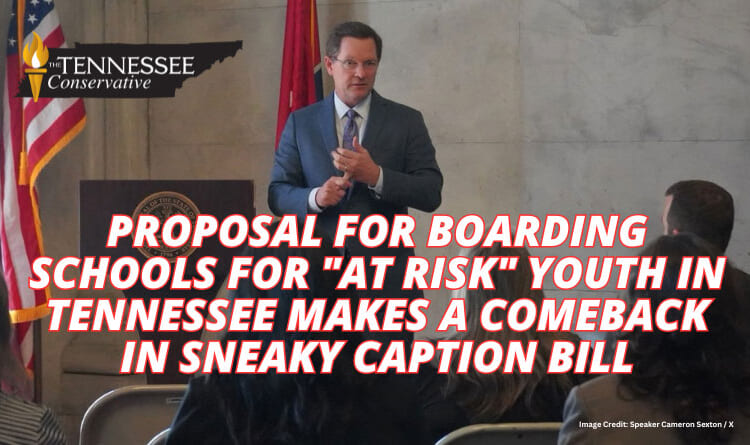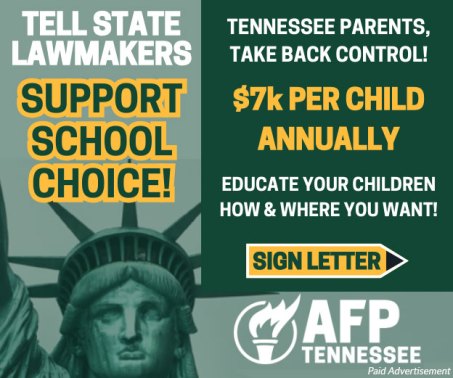Image Credit: Speaker Cameron Sexton / X
The Tennessee Conservative [By Paula Gomes] –
A proposal for boarding schools serving “at risk” youth in Tennessee is back from last year’s legislative session in a new sneaky caption bill.
Speaker Cameron Sexton (R-Crossville-District 25) is once again sponsoring a bill that would create a new type of charter school that would have a residential component.
House Bill 2922 (HB2922) began this year as a caption bill with an unrelated summary that pertained to standardized forms for the reporting of student allergies.
The bill sat unnoticed after being filed at the beginning of the 2024 legislative session until almost a month and a half later when the amendment that rewrites the bill was finally discussed in both chambers.
The corresponding Senate Bill 2820 (SB2820) is sponsored by Senator Ferrell Haile (R-Gallatin-District 18).
On Wednesday, the Senate Education Committee voted unanimously to send the bill to the Senate Calendar Committee.
If the bill becomes law, children as young as 11-years-old could be enrolled in “Opportunity Charter Schools” and sent across the state, separating them from their families and communities.
Co-sponsor of HB2922 Representative William Slater who presented the bill to the members of the K-12 Subcommittee on Tuesday said that he did not see many students having to board at the schools as that would be expensive. For those children that would need to do so, Slater said that non-profit organizations would partner with the charter schools to provide housing.
According to the amendment, “at-risk students” must come from families whose income is below 200% of the federal poverty level (around $60,000 a year for a family of 4) to be eligible for enrollment in these new charter schools – serving middle school or high school students – and meet at least one of the following criteria:
• The student is a dropout
• A juvenile delinquent or student who is “awaiting disposition of charges that may result in adjudication as a juvenile delinquent
• A student previously detained or incarcerated in a juvenile detention center
• Been retained at least two times in any of the grades from Kindergarten through 8th or the student is a year or more behind in obtaining the credit required for promotion either to the next grade or to graduate high school in 4 years with their peers
• Chronically absent students (as defined in Tennessee’s Every Student Succeeds Act (ESSA) plan
• A pregnant or “mothering” student
• Students with substance abuse issues
• Students experiencing abuse or neglect
Representative Sam McKenzie (D-Knoxville-District 15) inquired whether the income requirements could be raised to 400% of the federal poverty level, which would include families making around $125,000 (for a family of 4.) Slater agreed that the current income requirement was “narrow” and seemed amenable to broadening it.
During discussion, Representative Bryan Richey (R-Maryville-District 20) asked for an explanation of the term “mothering” only to be told there was no legal definition. Slater said that it was meant to convey “being a parent” which Richey took issue with. “When I parent my children, I don’t “mother” them,” Richey said.
Last year’s iteration of the bill would have created year-round residential and boarding schools for students classified as “economically disadvantaged” per ESSA; homeless, foster, runaway, or migrant students; students of a family eligible for free or reduced-price lunch; at risk of educational disadvantage due to abuse, neglect, or disability; or at risk of state custody due to “family dysfunction.”
Representative Mark White (R-Memphis-District 83) who carried the bill for Sexton last legislative session suggested that these residential schools could be a solution for the state’s Department of Children’s Services in finding suitable placements for children in their custody.
The bill will be heard again in the House Education Administration on March 27th, 2024.
About the Author: Paula Gomes is a Tennessee resident and reporter for The Tennessee Conservative.
You can reach Paula at paula@tennesseeconservativenews.com.













